-
 Caption: Nipah virus pathogenesis through respiration to disease in other organs of the body. Picture: Limei Wang, Denghui Lu, Maosen Yang, Shiqi Chai, Hong Du, Hong Jiang from their article published http://dx.doi.org/10.1007/s11684-024-1078-2
Caption: Nipah virus pathogenesis through respiration to disease in other organs of the body. Picture: Limei Wang, Denghui Lu, Maosen Yang, Shiqi Chai, Hong Du, Hong Jiang from their article published http://dx.doi.org/10.1007/s11684-024-1078-2
News
Is the Nipah virus the next emerging pathogen that will cause a pandemic?
Jan 22 2025
Nipah virus (NiV), has shown itself to be an emerging zoonotic virus which may yet have severe human health implications. It has attracted attention due to its high fatality rates and growing potential for human-to-human transmission and so poses an emerging threat to global public health.
The natural hosts of NiV are fruit bats but pigs have been seen to serve as an amplifying host species hence facilitating an easier zoonotic jump into humans. There is also some evidence of NiV infection in several domesticated animal species including dogs, cats, goats and horses. Its transmission comes through direct contact with secretions and excretions of infected bats, pigs and humans alike.
The state of Kerala in India has had six outbreaks in six years ─ up to September 2024 ─ when a second death was confirmed by the country’s national laboratory on 15 September. This death was part of the second outbreak in the state in only 12 months. Kerala has been a hot zone for NiV outbreaks since 2018 with dozens of deaths linked to the virus over that period. It can cause severe illness and death.
The World Health Organization has listed NiV as a priority pathogen with a high potential to cause a future pandemic.
Human infections have been reported across Malaysia, Singapore, Bangladesh, India, and the Philippines in a series of outbreaks since it was initially isolated in Malaysia in 1999 among pig farmers. Since first emerging in the region, NiV is known for its recurrent outbreaks. It has distinct genetic lineages ─ NiV-MY and NiV-BD ─ which differ in both pathogenicity and transmissibility.
Typically, the pathogenesis of NiV involves an initial infection via the respiratory tract, which is followed by systemic spread and leads to vasculitis and wider organ infection. NiV’s ability to both evade its host’s immune response and cause endothelial cell damage has contributed to its high death rate of up to 75%.
NiV infection presents with a range of symptoms, from nonspecific flu-like illness to severe neurological complications. There is also a significant risk of relapse and late-onset encephalitis among its survivors. Currently, there is no specific antiviral treatment for NiV infection and disease management relies on supportive care.
Development of a vaccine against NiV is a priority, with various approaches under investigation, including virus-like particle-based and mRNA-based vaccines. However, no vaccine has yet been approved for use in humans.
Update to 23 January 2025: Oxford University commences clinical trial of candidate vaccine against deadly Nipah virus
For further reading please visit:
https://link.springer.com/article/10.1007/s11684-024-1078-2
https://www.thelancet.com/journals/lanmic/article/PIIS2666-5247(23)00361-0/fulltext
https://www.pirbright.ac.uk/our-science/viruses/nipah-virus
Digital Edition
Lab Asia Dec 2025
December 2025
Chromatography Articles- Cutting-edge sample preparation tools help laboratories to stay ahead of the curveMass Spectrometry & Spectroscopy Articles- Unlocking the complexity of metabolomics: Pushi...
View all digital editions
Events
Jan 21 2026 Tokyo, Japan
Jan 28 2026 Tokyo, Japan
Jan 29 2026 New Delhi, India
Feb 07 2026 Boston, MA, USA
Asia Pharma Expo/Asia Lab Expo
Feb 12 2026 Dhaka, Bangladesh


















